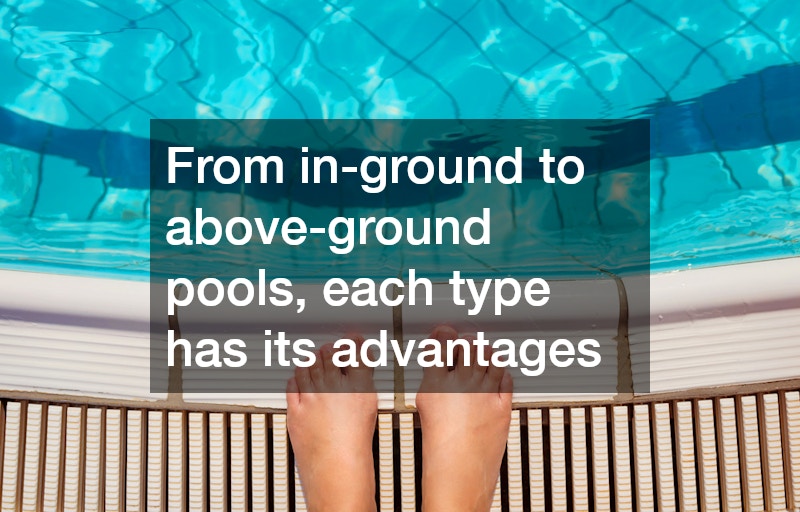When it comes to building or renovating a swimming pool, many homeowners focus on the exciting end result—crystal-clear water, backyard gatherings, and a relaxing escape from the summer heat. However, what often gets overlooked is the process and expertise required to bring that vision to life. Swimming pool contractors play a crucial role in turning ideas into reality, and they want clients to understand the factors that ensure a smooth, successful project. From design choices to timelines and maintenance, there are key insights contractors wish every homeowner knew before diving in.
Having a clear picture of what your swimming pool contractor truly wants you to know is crucial. Dive into the world of swimming pool construction and maintenance to better understand what to expect from your pool contractor, the common questions you might have, and tips for a successful project.
What Should I Consider Before Hiring a Pool Contractor?
Choosing the right contractor is crucial for a successful pool project. Consider their experience, reviews, and any licensure or accreditation. Look for contractors who have a solid portfolio and good references, as this can provide insight into their craftsmanship and reliability.
Additionally, communication is key; ensure that your contractor is approachable and responsive. A contractor who listens to your needs and addresses concerns promptly will help make the process smoother. It’s recommended to have a clear understanding of their expected availability and responsiveness throughout the project.
Don’t hesitate to ask for detailed quotes and to clarify what is included in the pricing. Understanding their payment structure, including any upfront costs and potential additional fees, will help you budget effectively. This transparency can also signify a trustworthy contractor who values honesty in their business practices.
What Are the Most Common Types of Pool Designs?
From in-ground to above-ground pools, each type has its advantages and disadvantages. In-ground pools offer permanence and aesthetics, while above-ground pools can be a cost-effective solution for those on a budget. Understanding the pros and cons of each can assist in making the right choice for your property.
Concrete, fiberglass, and vinyl are the three main materials used for in-ground pools, each with its own benefits. For instance, concrete pools are highly customizable but can be more expensive and time-consuming to install. Fiberglass pools are quicker to install and require less maintenance, but have limited design options.
When considering design, also think about the yard’s size and shape, as well as how you plan to use the pool. Whether for recreation, exercise, or relaxation, the design should fit both your lifestyle and aesthetic preferences, ensuring that the pool is a perfect addition to your home and landscaping.
What is the Pool Construction Timeline?
Understanding the timeline for construction can help set expectations. Typically, building a pool involves several phases, including design consultation, permitting, excavation, plumbing, and then installation. Knowing this timeline enables homeowners to plan and prepare their yards accordingly.
On average, a complete pool installation can take anywhere from a few weeks to several months. Factors such as weather conditions, permitting processes, and the complexity of the pool design can all impact this timeline. Homeowners should remain flexible and patient, as delays can occur.
Regular communication with your contractor throughout the construction process is crucial. By staying informed about progress and any potential hurdles, you can ensure that the project stays on track and address any issues as they arise. Awareness of the timeline allows for better planning around the disruptions construction may cause.
What Maintenance Do Pools Require After Installation?
Post-installation maintenance is key to longevity. Regular cleaning, chemical balancing, and filter maintenance are essential tasks that keep your pool in optimal condition. Understanding these responsibilities can help you decide whether to manage maintenance personally or hire a professional service.
Seasonal maintenance tasks, such as winterization, are also critical. In colder climates, properly preparing your pool for winter can prevent damage and costly repairs during the off-season. This planning can extend the life of your pool, making it an enjoyable feature for years to come.
Your contractor will likely provide recommendations on maintenance schedules and best practices tailored to your specific pool design and location. Following these guidelines can help maintain a safe, clean, and beautiful swimming environment, providing peace of mind for you and your family.
Working with a swimming pool contractor is about more than just getting the job done—it’s about building a partnership that ensures your pool is safe, functional, and a lasting source of enjoyment. By understanding the challenges, responsibilities, and considerations your contractor faces, you can approach the project with realistic expectations and a collaborative mindset. This not only helps avoid costly mistakes and delays but also makes the entire process smoother and more rewarding. When homeowners and contractors are on the same page, the result is a backyard oasis that brings lasting value and enjoyment for years to come. By arming yourself with knowledge about pool construction and maintenance, you can foster a better relationship with your contractor and ensure that your swimming pool meets your expectations and fits your lifestyle. Understanding the ins and outs of pool installation will also empower you to make informed decisions throughout the process.

